#Max there too
Explore tagged Tumblr posts
Text
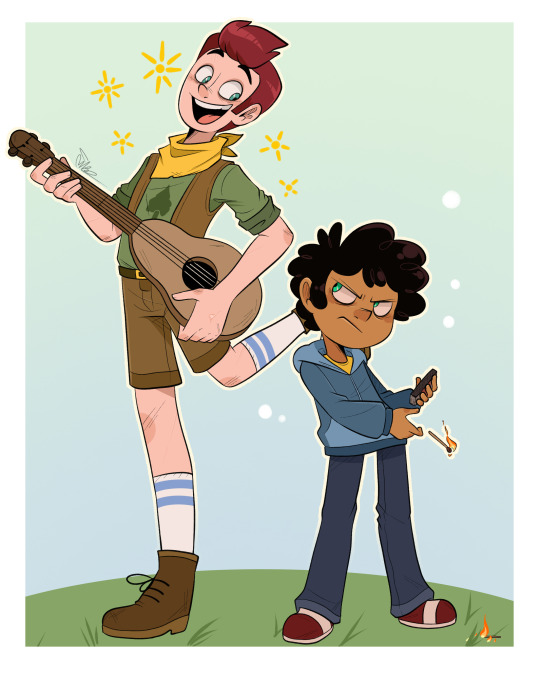
Been rewatching Camp Camp recently
#my art#Fanart#Camp Camp#camp camp fanart#camp camp david#camp camp max#David is so lovable I swear#Literally perfect man#I wanna squish him#Max there too#Love my angsty chaotic child
480 notes
·
View notes
Text

I heard these dogs are gay
#bradley uppercrust iii#max goof#an extremely goofy movie#maxley#fanart#art#I half assed this#don't look too hard
8K notes
·
View notes
Text
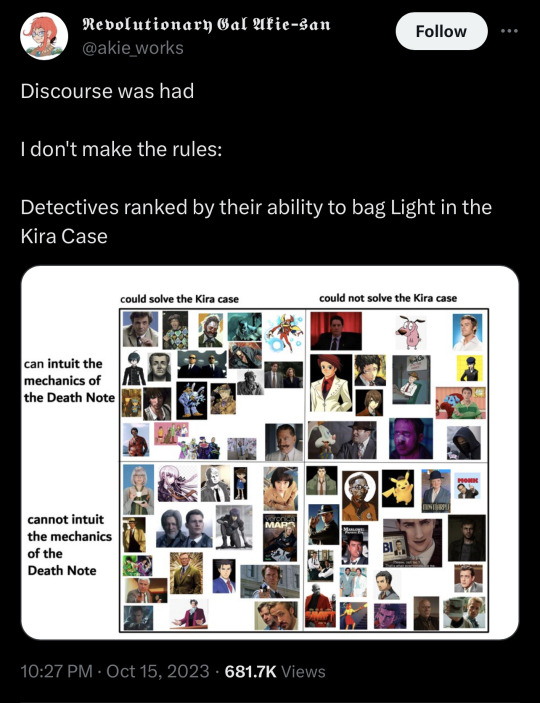
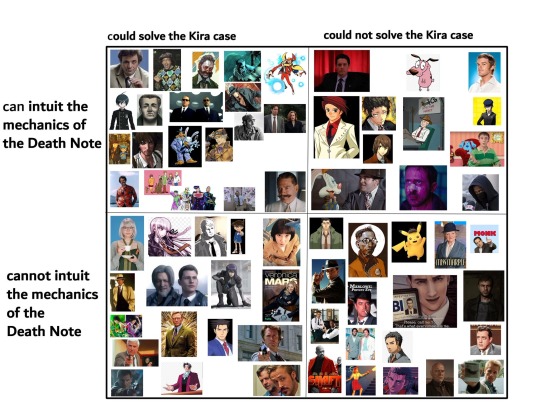
(link to original)
#too many things to tag and i don’t know a lot but#my favorite inclusions#columbo#batman#shuichi saihara#kyoko kirigiri#sam and max#charlie kelly#kamen rider#hidari shoutaro#philip#phoenix wright#blues clues#roger rabbit#hank schrader#death note#kira#light yagami
45K notes
·
View notes
Text

if you can’t own the anime figure, why not draw it (lol!)
#my art#fanart#vocaloid#luka#megurine luka#luka fanart#lineless#lineless art#emily loves cookies#clip studio paint#reference: max factory luka 1/7 scale#ALSO IK THE HAND IS BACKWARDS IM A COWARD AND IT'S TOO LATE TO FIX AAAAA
9K notes
·
View notes
Text
Going back to Zag's romantic relationships from Mel is extremely hilarious to me because of how comparatively well-adjusted he was.
Sure he done fucked up with Meg in the past and they had to kill each other as part of the job description, his sudden leaving seriously hurt Than while also having communication issues w/ each other, and there's the matter of Dusa being a lowly servant of the House. But in the end, he sorted everything out with 0 grievances from all parties involved (that one dialogue where Than admits Meg is the one who tells him to finally pursue Zag seriously warms my heart). Got the Mom(s) Seal of Approval™ even, and from Achilles too!
Meanwhile I look at Melinoë and she has a frankly criminal amount of situationships. Her rizz level is insane and she goes straight for the throat when flirting yet somehow her dating life is simultaneously a mess and nonexistent. Nemesis regularly kicks her into the dirt verbally AND physically but is the only person to acknowledge how fucked up it is that Mel is sent out alone in the hopes of killing an all powerful Titan that took SIX gods to kill in the past. "Fuck you and fuck your stupid frog in particular" then turns around and gives free Death Defiances. Her and Moros try to flirt with each other but they kept missing the mark because sometimes one of them says something totally unhinged like it was normal (I don't think watching people die is an appropriate bathtime conversation topic, my man). Her and Eris are a hot mess—literally with all those rounds she shot at Mel AND without a basis of workplace professionalism. Icarus is one shot nerve away from accidentally proclaiming his undying (literally) love to her but his guilt complex is hanging on to that nerve. And then there's Arachne and her not so little crush warring with the fact that said crush is family with and is helping the gods who cursed her.
Never have I realized how important it is that Zag has become a minor god of relationship counselling until I look at his baby sister and think, "yeah girl you definitely need help for all that shit".
#ksatalks#hades 2#hades 2 spoilers#hades game#girl you're a fucking mess (affectionate)#can't wait to see how all of this will blow up when we can max out relationship gauges#melinoë#melinoë hades#zagreus hades#megzagthan#melnem#melmor#meleris#waxwitch#is there a ship name for mel/arachne yet?#too many characters to tag so i will not lmao
5K notes
·
View notes
Text

The moment, when he stops yappin’
#fanart#bradley uppercrust iii#maxley#an extremely goofy movie#feelin lil too shy#taakiitoo#max x bradley
5K notes
·
View notes
Text
The one weird monopoly trick that gave us Walmart and Amazon and killed Main Street
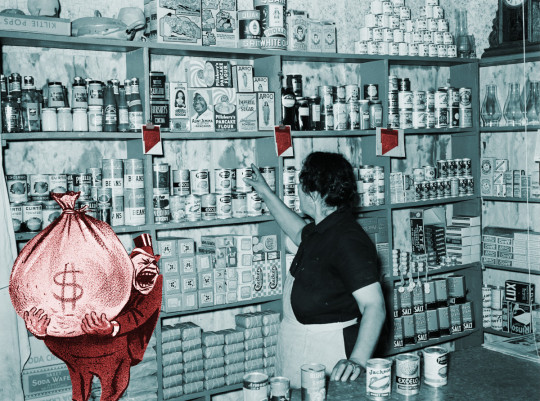
I'm coming to BURNING MAN! On TUESDAY (Aug 27) at 1PM, I'm giving a talk called "DISENSHITTIFY OR DIE!" at PALENQUE NORTE (7&E). On WEDNESDAY (Aug 28) at NOON, I'm doing a "Talking Caterpillar" Q&A at LIMINAL LABS (830&C).

Walmart didn't just happen. The rise of Walmart – and Amazon, its online successor – was the result of a specific policy choice, the decision by the Reagan administration not to enforce a key antitrust law. Walmart may have been founded by Sam Walton, but its success (and the demise of the American Main Street) are down to Reaganomics.
The law that Reagan neutered? The Robinson-Patman Act, a very boring-sounding law that makes it illegal for powerful companies (like Walmart) to demand preferential pricing from their suppliers (farmers, packaged goods makers, meat producers, etc). The idea here is straightforward. A company like Walmart is a powerful buyer (a "monopsonist" – compare with "monopolist," a powerful seller). That means that they can demand deep discounts from suppliers. Smaller stores – the mom and pop store on your Main Street – don't have the clout to demand those discounts. Worse, because those buyers are weak, the sellers – packaged goods companies, agribusiness cartels, Big Meat – can actually charge them more to make up for the losses they're taking in selling below cost to Walmart.
Reagan ordered his antitrust cops to stop enforcing Robinson-Patman, which was a huge giveaway to big business. Of course, that's not how Reagan framed it: He called Robinson-Patman a declaration of "war on low prices," because it prevented big companies from using their buying power to squeeze huge discounts. Reagan's court sorcerers/economists asserted that if Walmart could get goods at lower prices, they would sell goods at lower prices.
Which was true…up to a point. Because preferential discounting (offering better discounts to bigger customers) creates a structural advantage over smaller businesses, it meant that big box stores would eventually eliminate virtually all of their smaller competitors. That's exactly what happened: downtowns withered, suburban big boxes grew. Spending that would have formerly stayed in the community was whisked away to corporate headquarters. These corporate HQs were inevitably located in "onshore-offshore" tax haven states, meaning they were barely taxed at the state level. That left plenty of money in these big companies' coffers to spend on funny accountants who'd help them avoid federal taxes, too. That's another structural advantage the big box stores had over the mom-and-pops: not only did they get their inventory at below-cost discounts, they didn't have to pay tax on the profits, either.
MBA programs actually teach this as a strategy to pursue: they usually refer to Amazon's "flywheel" where lower prices bring in more customers which allows them to demand even lower prices:
https://www.youtube.com/watch?v=BaSwWYemLek
You might have heard about rural and inner-city "food deserts," where all the independent grocery stores have shuttered, leaving behind nothing but dollar stores? These are the direct product of the decision not to enforce Robinson-Patman. Dollar stores target working class neighborhoods with functional, beloved local grocers. They open multiple dollar stores nearby (nearly all the dollar stores you see are owned by one of two conglomerates, no matter what the sign over the door says). They price goods below cost and pay for high levels of staffing, draining business off the community grocery store until it collapses. Then, all the dollar stores except one close and the remaining store fires most of its staff (working at a dollar store is incredibly dangerous, thanks to low staffing levels that make them easy targets for armed robbers). Then, they jack up prices, selling goods in "cheater" sizes that are smaller than the normal retail packaging, and which are only made available to large dollar store conglomerates:
https://pluralistic.net/2023/03/27/walmarts-jackals/#cheater-sizes
Writing in The American Prospect, Max M Miller and Bryce Tuttle1 – a current and a former staffer for FTC Commissioner Alvaro Bedoya – write about the long shadow cast by Reagan's decision to put Robinson-Patman in mothballs:
https://prospect.org/economy/2024-08-13-stopping-excessive-market-power-monopoly/
They tell the story of Robinson-Patman's origins in 1936, when A&P was using preferential discounts to destroy the independent grocery sector and endanger the American food system. A&P didn't just demand preferential discounts from its suppliers; it also charged them a fortune to be displayed on its shelves, an early version of Amazon's $38b/year payola system:
https://pluralistic.net/2022/11/28/enshittification/#relentless-payola
They point out that Robinson-Patman didn't really need to be enacted; America already had an antitrust law that banned this conduct: section 2 of the the Clayton Act, which was passed in 1914. But for decades, the US courts refused to interpret the Clayton Act according to its plain meaning, with judges tying themselves in knots to insist that the law couldn't possibly mean what it said. Robinson-Patman was one of a series of antitrust laws that Congress passed in a bid to explain in words so small even federal judges could understand them that the purpose of American antitrust law was to keep corporations weak:
https://pluralistic.net/2023/04/14/aiming-at-dollars/#not-men
Both the Clayton Act and Robinson-Patman reject the argument that it's OK to let monopolies form and come to dominate critical sectors of the American economy based on the theoretical possibility that this will lead to lower prices. They reject this idea first as a legal matter. We don't let giant corporations victimize small businesses and their suppliers just because that might help someone else.
Beyond this, there's the realpolitik of monopoly. Yes, companies could pass lower costs on to customers, but will they? Look at Amazon: the company takes $0.45-$0.51 out of every dollar that its sellers earn, and requires them to offer their lowest price on Amazon. No one has a 45-51% margin, so every seller jacks up their prices on Amazon, but you don't notice it, because Amazon forces them to jack up prices everywhere else:
https://pluralistic.net/2024/03/01/managerial-discretion/#junk-fees
The Robinson-Patman Act did important work, and its absence led to many of the horribles we're living through today. This week on his Peoples & Things podcast, Lee Vinsel talked with Benjamin Waterhouse about his new book, One Day I’ll Work for Myself: The Dream and Delusion That Conquered America:
https://athenaeum.vt.domains/peoplesandthings/2024/08/12/78-benjamin-c-waterhouse-on-one-day-ill-work-for-myself-the-dream-and-delusion-that-conquered-america/
Towards the end of the discussion, Vinsel and Waterhouse turn to Robinson-Patman, its author, Wright Patman, and the politics of small business in America. They point out – correctly – that Wright Patman was something of a creep, a "Dixiecrat" (southern Democrat) who was either an ideological segregationist or someone who didn't mind supporting segregation irrespective of his beliefs.
That's a valid critique of Wright Patman, but it's got little bearing on the substance and history of the law that bears his name, the Robinson-Patman Act. Vinsel and Waterhouse get into that as well, and while they made some good points that I wholeheartedly agreed with, I fiercely disagree with the conclusion they drew from these points.
Vinsel and Waterhouse point out (again, correctly) that small businesses have a long history of supporting reactionary causes and attacking workers' rights – associations of small businesses, small women-owned business, and small minority-owned businesses were all in on opposition to minimum wages and other key labor causes.
But while this is all true, that doesn't make Robinson-Patman a reactionary law, or bad for workers. The point of protecting small businesses from the predatory practices of large firms is to maintain an American economy where business can't trump workers or government. Large companies are literally ungovernable: they have gigantic war-chests they can spend lobbying governments and corrupting the political process, and concentrated sectors find it comparatively easy to come together to decide on a single lobbying position and then make it reality.
As Vinsel and Waterhouse discuss, US big business has traditionally hated small business. They recount a notorious and telling anaecdote about the editor of the Chamber of Commerce magazine asking his boss if he could include coverage of small businesses, given the many small business owners who belonged to the Chamber, only to be told, "Over my dead body." Why did – why does – big business hate small business so much? Because small businesses wreck the game. If they are included in hearings, notices of inquiry, or just given a vote on what the Chamber of Commerce will lobby for with their membership dollars, they will ask for things that break with the big business lobbying consensus.
That's why we should like small business. Not because small business owners are incapable of being petty tyrants, but because whatever else, they will be petty. They won't be able to hire million-dollar-a-month union-busting law-firms, they won't be able to bribe Congress to pass favorable laws, they can't capture their regulators with juicy offers of sweet jobs after their government service ends.
Vinsel and Waterhouse point out that many large firms emerged during the era in which Robinson-Patman was in force, but that misunderstands the purpose of Robinson-Patman: it wasn't designed to prevent any large businesses from emerging. There are some capital-intensive sectors (say, chip fabrication) where the minimum size for doing anything is pretty damned big.
As Miller and Tuttle write:
The goal of RPA was not to create a permanent Jeffersonian agrarian republic of exclusively small businesses. It was to preserve a diverse economy of big and small businesses. Congress recognized that the needs of communities and people—whether in their role as consumers, business owners, or workers—are varied and diverse. A handful of large chains would never be able to meet all those needs in every community, especially if they are granted pricing power.
The fight against monopoly is only secondarily a fight between small businesses and giant ones. It's foundationally a fight about whether corporations should have so much power that they are too big to fail, too big to jail, and too big to care.

Community voting for SXSW is live! If you wanna hear RIDA QADRI and me talk about how GIG WORKERS can DISENSHITTIFY their jobs with INTEROPERABILITY, VOTE FOR THIS ONE!

If you'd like an essay-formatted version of this post to read or share, here's a link to it on pluralistic.net, my surveillance-free, ad-free, tracker-free blog:
https://pluralistic.net/2024/08/14/the-price-is-wright/#enforcement-priorities
#pluralistic#Robinson-Patman Act#ftc#alvaro bedoya#monopoly#monopsony#main street#too big to jail#too big to care#impunity#regulatory capture#prices#the american prospect#Max M Miller#Bryce Tuttle#a and p#wright patman
2K notes
·
View notes
Text
Drivers as animals headcanons presented by plushies with hats:
RedBull Ferrari


Mclaren Mercedes


Aston Martin Alpine


Haas Williams


VCARB Sauber


#been waiting to make an animals headcanon post so here’s something cute :)#also shoutout to wewentcarracing for enlightening me with seal lance propaganda#havent been able to see lance as anything else since then#its too perfect#fernando alonso#max verstappen#lance stroll#lando norris#carlos sainz#george russell#oscar piastri#charles leclerc#lewis hamilton#and the others#f1#f1 grid#grid post#my edit
1K notes
·
View notes
Text

Max (freshly 4 time WDC. grown man) ogling the shinies on the ceiling in the cooldown car is so real actually
#very autism. I'd stare at those too#f1#formula 1#las vegas gp 2024#mv33#max verstappen#nebrain#neb50#neb100#neb200#neb500#neb750#neb1000#neb1500#neb2000
2K notes
·
View notes
Text

#dan and phil and a tiny horse#they are too cunty#i love them#to the max#dan and phil#amazingphil#phil lester#dan howell#dnp#phan#my glitter pics#daniel howell
2K notes
·
View notes
Text

i learned to turn and look the other way
#gravity falls#the book of bill#stanley pines#grunkle stan#dipper pines#mabel pines#dipper and mabel#book of bill#this was the companion piece of the first meeting illust#thisisnotawebsitedotcom#sorry i got too emotionally attached to the door handle coloring to erase it & make it bg accurate#caption is from the song “death & destruction" by weezer#that song has like max 3 sentences but i feel like its v stan..
2K notes
·
View notes
Text

love them so much <33
#spent too much time on this#procreate#life is strange#lis#life is strange 2#lis 2#max caulfield#chloe price#pricefield#sean diaz#daniel diaz#life is strange sean#my pookie wookies#digital art#digital artist#art#my art#my artwork#my art <3#fandom#fanart#life is strange fanart#life is strange art
3K notes
·
View notes
Text
knowing max's ass was sprinting through the paddock while this was happening.. never beating the romcom allegations
#he took sprint weekend too literally ❤️#lestappen#charles leclerc#max verstappen#f1#formula 1#austrian gp 2024
2K notes
·
View notes
Text
Having thoughts of The Party being touchy as all fuck after everything.
Like you cannot enter nor leave any kind of hang out without a hug, high-five, pat, or anything from everyone you were hanging out with.
And then, suddenly, you aren’t able to leave without a kiss or hug of some kind from Steve.
It started after the bullshit that was the Starcourt Mall. The kids were leaving Steve’s house from a DnD session maybe 2 months before the Byers left for Cali.
Dustin was taking forever to pull his shoes on and get out the house to his moms car and everyone was complaining. It was one of those rare times where Steve wasn’t the one carting them all around— they all had their own rides.
Dustin got his shoes on and Steve handed him his bag and— without thinking— pressed a kiss to the top of his hat before waving him out the door.
The rest of the kids are silent until Mike speaks up bitchily “what about us, asshole?”
Steve has no idea what they mean until El points to her head with a grin. Steve deals out head and forehead kisses for everyone and waves them off to their respective rides.
And then it just— sticks. At first it’s with just the kids whenever he sees them. He’ll usually greet them with a hug or an exasperated sigh and then say goodbye with a kiss to their foreheads.
Not even Mike complains. This is the kind of shit he never got while growing up— might as well make the best of it.
And then it migrates to Robin as well, and the Nancy is joining in on the hugs (they’re still too awkward for the kisses but the hugs are enough for now).
And Steve never holds back, not even in public. Again, no one complains.
And that’s how Hellfire finds out about the kissing arrangement (that might be the title of this if I make it an actual fic). They watch as Steve presses a forehead kiss to Mike, Lucas, and Dustin before waving them off and then presses a kiss to Max’s head and giving her a tight hug.
The guys try to make fun of the kids for it but none of them are embarrassed.
“It’s Steve, dude. He’s like a mom.”
“The kisses are actually really comforting.”
“It’s a Party thing.”
And then the fuckery of 1986 and Vecna happens and suddenly Eddie’s in on the hugs and pats and high-fives.
And then.
And then.
He’s in on the kisses.
Steve doles out the kisses like usual one night after Hellfire and gives one to everyone— including Eddie.
And Eddie panics and gives Steve one right back.
And then the kids are going feral about wanting to give Steve a kiss too.
And Eddie leaves during the chaos.
And then they don’t talk about it.
Until Steve and Eddie do it again.
And the kids accept is as the new normal; you have to give Steve a kiss back.
And then Steve and Eddie have an excuse to kiss each other on the foreheads and cheeks and noses.
One night they’re hanging out, just the two of them at the trailer after Wayne left for work.
Steve had greeted Eddie with a tight hug the moment he’d gotten in the trailer. Eddie had squeezed back just as tight if not tighter.
Steve was getting ready to leave, and on instinct leant in to kiss Eddie, but Eddie was also leaning in to kiss Steve. So they meet in the middle and accidentally kiss on the lips.
And then the new normal for Steve and Eddie is kissing on the lips goodbye.
Idk, just Steve being a very touchy feely person makes me so happy
#stranger things#steve harrington#eddie munson#dustin henderson#mike wheeler#robin buckley#will byers#lucas sinclair#max mayfield#steddie#el hopper#nancy wheeler#yes jonathan also gets hugs and kisses from steve#argyle is all too happy to indulge in steves kisses#it’s make eddie jealous if that wasn’t just how argyle was#steve harrington gives great hugs#everyone agrees#bisexual steve harrington#gay eddie munson#steddie idea#but it doesn’t have to be#this can also just be steve and the kids if you wanted#everyone is touch starved#my mom doesn’t know what touch starved means#I had to explain it to her 🥲#that’s all#goodbye!!!
3K notes
·
View notes
Text

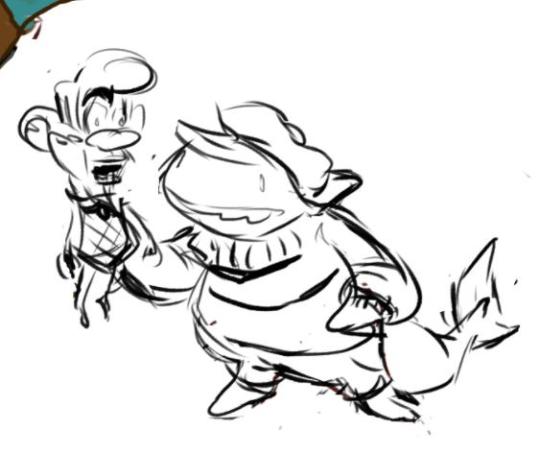
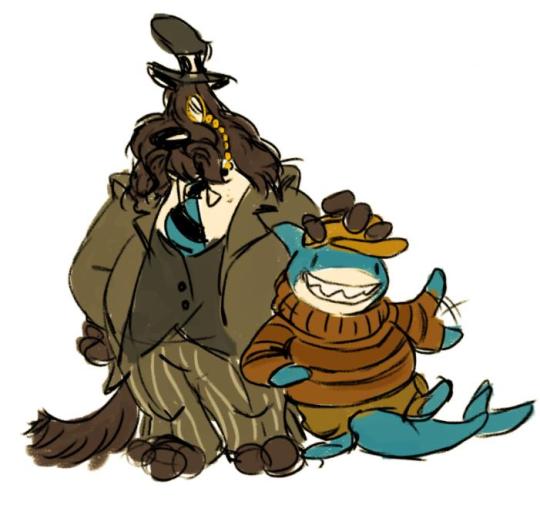
Sammeth and maximus if telltale wasn't fucking around
#sam and max#sam & max#strong believer of shark max genetics#i think its a very fun concept#last sketch is like two months old Instagram repost don't mind that#might post more stuff from insta here at some point too#sammeth is still an irish wolfhound but just let's his fur grow very long#sammeth and maximus#my beloveds#tea art
1K notes
·
View notes
Text



via
(ty @rb19, @reigningm4x, + @blamemma for the source work 🤍)
#max verstappen#f1#op#im so serious i was spending my entire morning going feral over where to find these#and i had to make it everyone elses problem too
704 notes
·
View notes